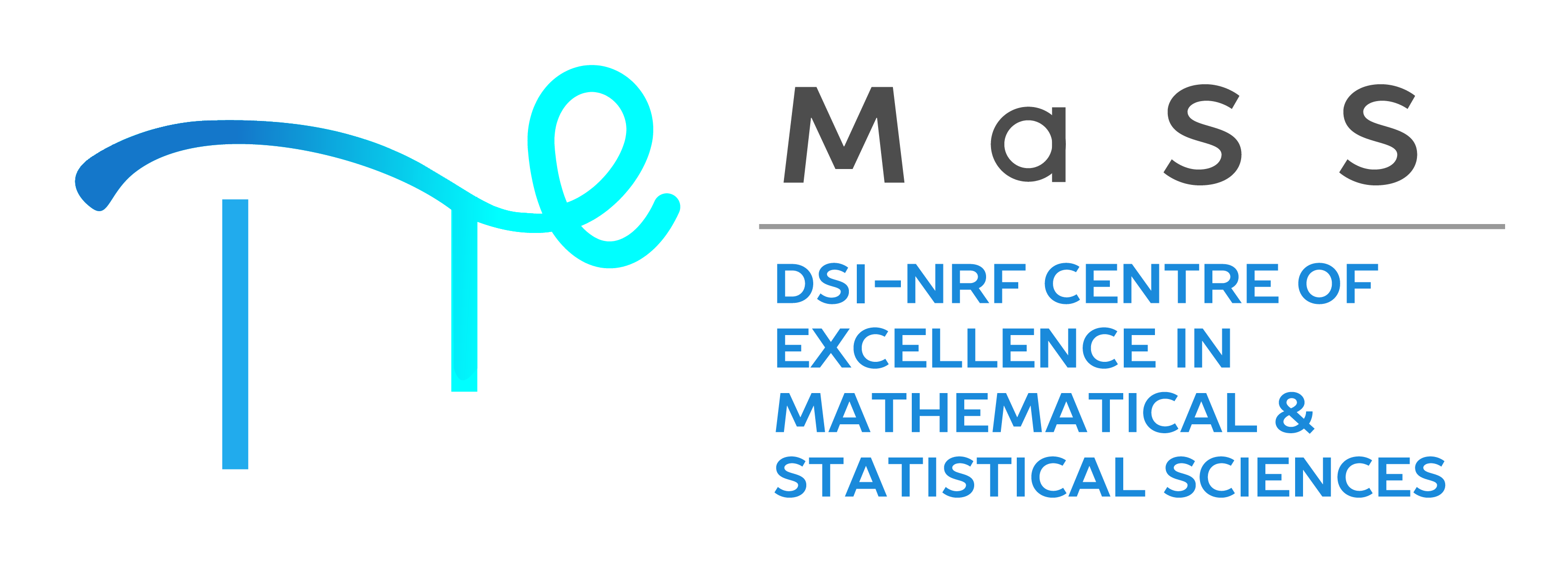Probabilistic weak solutions for stochastic
Navier-Stokes variational inequalities
Mamadou Sango, University of
Pretoria
SAMS Subject Classification Number: 3, 26
In this talk we present an existence result for probabilistic weak (martingale) solutions for stochastic Navier-Stokes variational inequalities involving unilateral boundary conditions and nonlinear forcings driven by Wiener processes. The setting of the problem follows.
Let \(D\) be a simply connected domain bounded in \(\mathbb{R}^{3}\) with a sufficiently smooth boundary \(\partial D\) (at least \(C^{2}\)). We fix a final time \(T>0\) and denote by \(Q_{T}\) the cylindrical domain \(\left( 0,T\right) \times D\). Given a convex, lower semicontinuous function \[\varphi :\mathbb{R\times }\partial D\rightarrow (-\infty ,\infty ],\qquad{(1)}\] and letting \(u_{n}=u\cdot n\) be the normal component of \(u\); \(n\) being the outward unit normal vector field to \(\partial D\), we are interested in an hydrodynamical problem for the motion of a fluid under random fluctuations governed by the following subdifferential initial boundary value problem for the incompressible stochastic Navier-Stokes equations \[du+\left( \nabla \times u\times u-\nu \Delta u+\nabla P\right) dt=f\left( t,u\right) dt+g\left( t,u\right) dW\ \text{in }Q_{T}, \label{E-1}\qquad{(2)}\] \[\nabla \cdot u=0\ \text{in }Q_{T}, \label{E-2}\qquad{(3)}\] \[u_{\tau }=0\text{ on }\left( 0,T\right) \times \partial D, \label{E-3}\qquad{(4)}\] \[u\left( 0\right) =u_{0}\ \text{in }D, \label{E-4}\qquad{(5)}\] \[P\left( t,x\right) \in \partial \varphi \left( u_{n}\left( t,x\right) ,x\right) ,\ \text{for all }\left( t,x\right) \in \left( 0,T\right) \times \partial D, \label{SUBDIFF}\qquad{(6)}\]
where \(u\) is the velocity of the particles of fluid, \(\nabla\) denotes the gradient operator in \(\mathbb{R}^{3}\), \(u_{\tau }=u-\left( u\cdot n\right) n\) is the tangential component of \(u\),\(\ P=\) \(p+\left\vert u\right\vert ^{2}/2\) , the total or Bernouli’s pressure (\(p\) being the usual pressure),\(\ W\) a \(% l\)-dimensional Wiener process and the right hand-side of ([E-1]) represents the force acting on the fluid and consisting of a regular part involving the \(3-\)vector function \(f\) and a chaotic part involving the \(% 3\times l\) matrix function \(g\) and \(W\), the parameter \(\nu\) is the viscosity of the fluid, \(\partial \varphi\) denotes the subdifferential of \(% \varphi\), namely \[\partial \varphi \left( v,x\right) =\left\{ w\in \mathbb{R}:\varphi \left( \tilde{v},x\right) -\varphi \left( v,x\right) \geq w\left( \tilde{v}% -v\right) ,\ \text{for all }\tilde{v}\in \mathbb{R}\right\} .\qquad{(7)}\]
The study of stochastic models of fluid dynamics motivated by some aspects of the theory of turbulence in fluids has led to an impressive amount of important works. So far the main focus has been on systems of equations (stochastic Navier-Stokes, magnetohydrodynamic, and their non-newtonian counterparts). Our work undertakes to initiate the study of similar models driven by unilateral boundary conditions which lead to stochastic variational inequalities. The deterministic counterpart has been developed since the 1960’s by Lions, Brezis, Stampacchia, Bensoussan and their collaborators. The main result of this research is a stochastic counterpart of the work of Brezis on deterministic Navier-Stokes variational inequalities and generalizes several previous results on Stochastic Navier-Stokes equations to stochastic Navier-Stokes variational inequalities with unilateral boundary conditions.


